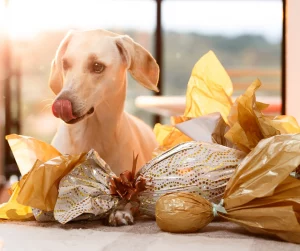As dedicated and experienced UK veterinarians, we are deeply committed to the well-being of your pets. Today, we want to shed light on common poisonings that our beloved pets may encounter in the UK. Knowledge is power, and awareness of these dangers can help keep your pets stay safe and sound.
Things poisonous to pets:
Chocolate Poisoning

Lily Poisoning
Lilies are a common household flower but are highly toxic to cats. Ingesting any part of the plant can lead to kidney failure, lethargy, vomiting, and loss of appetite. Keeping lilies far out of their reach is best if you have cats.
Antifreeze (Ethylene Glycol) Poisoning
As winter approaches, it’s essential to be cautious with antifreeze. Ethylene glycol, a component in many antifreeze products, is incredibly toxic to pets. Ingestion can cause symptoms like vomiting, seizures, and, ultimately, kidney failure. Ensure that spills are cleaned up promptly, and store antifreeze containers safely out of reach.
Paracetamol Poisoning in Cats
Paracetamol can be fatal to cats. Even a tiny amount can lead to severe illness, including damage to the liver and red blood cells. Symptoms may include drooling, difficulty breathing, and swelling of the face. Never give your cat any over-the-counter medications without veterinary guidance.
Slug Bait Poisoning
Slug bait, commonly used in gardens, contains chemicals like metaldehyde, which are highly toxic to pets. Ingestion can lead to muscle tremors, seizures, and can even be fatal. If you use slug bait, choose pet-safe alternatives and keep your pets away from treated areas.
Raisin and Grape Poisoning
Surprisingly, raisins and grapes can harm dogs, causing kidney failure. Symptoms may include vomiting, diarrhoea, and lethargy. Be cautious with any foods containing raisins or grapes, and keep them out of reach of your pets. Read more on how to prevent your dog from eating grapes or raisins in this article.
Xylitol Poisoning
Xylitol, a sugar substitute found in many sugar-free products like gum, can be highly toxic to dogs. Ingesting it can cause a rapid release of insulin, leading to hypoglycaemia (low blood sugar), seizures, and even liver failure. Keep xylitol-containing products securely stored away from your pets.
Rodenticide Poisoning (Rat Bait)
Rodenticides are designed to eliminate rats and mice but can also harm pets who ingest them. These products contain various toxic compounds, and symptoms vary depending on the type. Signs of poisoning may include lethargy, difficulty breathing, bleeding, and seizures. If you suspect your pet has ingested rodenticide, seek immediate veterinary care.
Onion and Garlic Poisoning
In various forms, onions and garlic can be toxic to dogs and cats. Ingestion can lead to gastrointestinal upset, lethargy, and, in severe cases, damage to red blood cells, causing anaemia. It’s best to avoid feeding these foods to your pets.
Household Cleaners and Chemicals
Household cleaners, such as bleach, toilet bowl cleaners, and disinfectants, can be harmful if ingested or if your pet comes into contact with them. Always store these products safely and ensure your pets cannot access areas where cleaning is in progress.
Plants and Flowers

Human Medications
Apart from paracetamol, several other human medications can be harmful to pets if ingested. These may include non-steroidal anti-inflammatory drugs (NSAIDs), antidepressants, and blood pressure medications.
Essential Oils
Certain essential oils can be toxic to pets, especially cats, when ingested or applied to the skin. Keep oils like tea tree, eucalyptus, and citrus oils out of reach of your pets.
Flea and Tick Products
Improper use of flea and tick products or using products intended for one species or another can lead to poisoning. Always follow your veterinarian’s recommendations for flea and tick control.
Mushroom Poisoning
Some wild mushrooms can be toxic to pets if ingested. It’s essential to prevent your pets from foraging for mushrooms in your garden or during walks.
Awareness of these potential hazards and taking precautions to prevent exposure can help keep your pets safe and healthy. If you suspect your pet has been exposed to any of these substances or shows unusual symptoms, contact Vet immediately.
How can I avoid my pet being poisoned?
The safety and well-being of our pets are of paramount importance. Here’s what you should do to protect your pets from common poisonings in the UK:
- Be aware of potential hazards: Know the substances that can harm your pets and take precautions to keep them out of reach.
- Vigilance is critical: Supervise your pets, especially in the garden or when exploring new areas.
- Seek immediate help: If you suspect your pet has ingested something toxic, don’t wait for symptoms to appear. Contact your veterinarian right away.
- Pet-proof your home: Securely store medications, chemicals, and potentially harmful foods out of your pet’s reach.
Remember, early intervention is crucial in poisoning cases. Your prompt action can significantly impact your pet’s chances of a full recovery. Always consult your veterinarian for guidance and treatment if you suspect your pet has been exposed to a toxic substance. Together, we can keep our beloved pets safe and happy.



